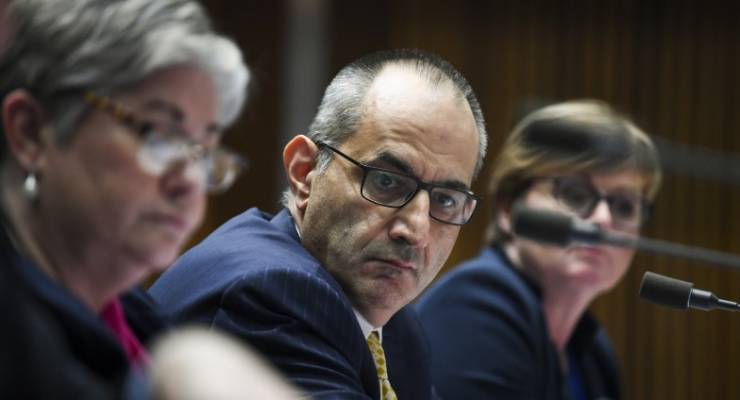
Annika Smethurst’s 2018 story that led to the Australian Federal Police raid on her home yesterday was something all too rare in Canberra: actual news, as in something someone in power doesn’t want us to know.
It deeply embarrassed the head of the Home Affairs department Mike Pezzullo, and by extension Pezzullo’s minister Peter Dutton. Dutton and Pezzullo have for years now presided over one of the most malicious, bungle-prone least competent portfolios in Commonwealth history, while pretending to be national security tough guys holding the line against foreign evil.
Smethurst revealed that Pezzullo and the head of defence Greg Moriarty had cooked up a plan to given the Australian Signals Directorate power to spy on and target Australians within Australia. ASD is Australia’s military intelligence outfit; cowboys regarded poorly by other members of the Australian Intelligence Community, and best known for being repeatedly embarrassed by the Edward Snowden leaks. This included revelations that they’d spied on the Indonesian president and on Indonesian trade negotiators to help American tobacco companies, and that they’d had to ask the NSA for help breaking into the PNG military’s encrypted systems.
The Pezzullo-Moriarty plans for the ASD to target Australians hadn’t been properly put to the Turnbull government, but after Smethurst’s story — which was backed by actual documents — they were abandoned quick smart amid humiliation and denial.
The AFP, at the request of the government, has been gunning for Smethurst ever since. The fact that she obtained documents means that there’s a good chance some sort of trail exists between her and her source, who might be a public servant, but may also be a ministerial staffer… or higher.
If the AFP wanted to use Smethurst’s metadata to identify her source, it would have had to apply for a Journalist Information Warrant to Attorney-General Christian Porter, which would have required them to make the case that “the public interest in issuing the warrant outweighs the public interest in protecting the confidentiality of the identity.”
Porter being the man who is prosecuting Witness K and Bernard Collaery for revealing crimes committed by the Howard government, it’s unlikely he would have needed much convincing — but at least it’s a hurdle. There’s no evidence at this point that such a warrant has been applied for in the year since the investigation began.
There are ways around the warrant: the AFP could simply draw up a list of everybody who could possibly have access to the document in the article, and get their metadata — no warrant is required to get the metadata of sources, or to go on vast fishing expeditions. But in this case it relied on something else. The fact that if it’s not a journalist’s metadata, there are no restrictions on what the AFP can seize regardless of whether it relates to a source or not — just seize Smethurst’s computer and phone and go through it at leisure. As long as there’s a general warrant relating to the search and seizure, the AFP is unrestrained in the way it can go after journalists’ sources.
The AFP insists that the raid relates to “an extremely serious matter that has the potential to undermine Australia’s national security”. That’s a flagrant lie — it relates merely to the embarrassment of Mike Pezzullo, Greg Moriarty, Peter Dutton and national security bureaucrats who crafted a power-grab in secret and are furious at being subjected to scrutiny. The use of the term “national security” is generally intended to shut down any scrutiny or discussion that might embarrass governments, and to block media questions about any crimes or corrupt conduct committed by them.
“National security” is the basis on which Porter is attempting to prevent the prosecution of Witness K and Bernard Collaery from being held in open court, and why he wants basic procedural fairness voided in the trial.
The Australian media has long been complicit in this use of national security as a justification for cover-ups. Mainstream media journalists fall silent when politicians and bureaucrats utter the words “national security”. Because what few journalists left who cover national security rounds are heavily dependent on intelligence community sources (which are usually self-serving), they tend to support this abuse of it. As a result, politicians and bureaucrats know that all they have to do is refuse to answer questions because of national security, and they’ll get a pass from most of the media.
Australian journalists growing a spine and refusing to accept this mushroom treatment is the first step in pushing back against the mindset that sees journalists raided for embarrassing bureaucrats. The first of many.








What did Keating say about nutters in charge?
Duttons been let off the chain.
Message to News Corp – Be careful what you wish for, did you think it couldn’t happen to you?
Your last para says what’s needed Bernard. Glove’s off, no more mucking about, this is a battle that must be won. No more arguments about who’s a journalist.
Journalists are on the front line in this war. It is a war that must be fought before we get a real extreme person in charge. God forbid.